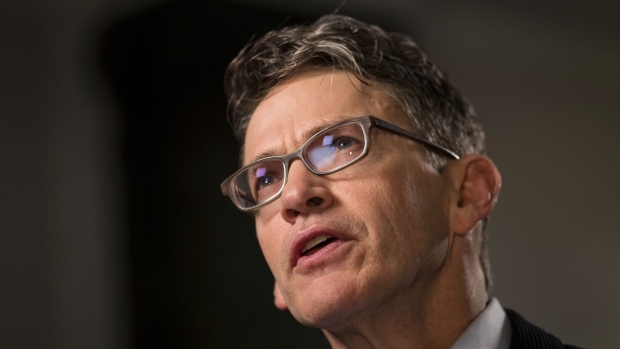Feb 9, 2023
Bayer Ushers In New Era After Roundup Wins Set Up Baumann’s Exit
, Bloomberg News

(Bloomberg) -- In his seven years as chief executive officer of Bayer AG, Werner Baumann spent $63 billion for Monsanto Co. — and then as much as $16 billion more to handle the avalanche of US lawsuits claiming that Monsanto’s weedkiller Roundup causes cancer.
While those costs infuriated plenty of investors, they also protected Baumann against repeated campaigns to oust him by creating a bulwark of turmoil and complicating any potential efforts to recruit a successor. That fog now is clearing, and the German drugs-to-herbicide giant has decided to move on.
In the past year, Bayer has been on a hot streak in US courtrooms, winning six Roundup trials in a row. That convinced some big investors that it’s finally time to bring in a much different leader to tackle the company’s other challenges.
“Once the problem is almost solved, it’s time for a new CEO,” said Markus Manns, a portfolio manager at Union Investment in Frankfurt, who joined other investors in calling for change earlier this year after long supporting Baumann. “This year, it became easier to find a good CEO.”
On Wednesday, Bayer surprised markets by announcing that ex-Roche pharma head Bill Anderson will take over as CEO in June. The 56-year-old American is an outsider and represents a clear break from the Baumann era. Investors welcomed the news, sending Bayer’s shares up 6% on Wednesday. The stock pared some of those gains on Thursday amid uncertainty over the speed and direction of potential changes.
“For the time being, we have a well-respected external hire as CEO, and external CEOs are a rarity at Bayer,” said Sebastian Bray, an analyst at Berenberg. “But there is not much more concrete information to go on.”
A decade ago, Bayer probably would have put a higher priority on finding a German to be CEO, according to Manns. But that’s become less relevant, especially after buying St. Louis-based Monsanto in 2018 and a series of investments in biotech companies located in places like San Francisco and Boston.
German rival Merck KGaA set a precedent in 2021 when it appointed Spanish native Belen Garijo — who prefers to speak publicly in English — to oversee its sprawling portfolio of science-based businesses. She’s a pharma expert, like Anderson, who is now overseeing a conglomerate with units focused on things as wide-ranging as drugs, semiconductors and coating materials for wood.
Anderson’s hiring heralds a cultural change at the Leverkusen-based company. The gregarious American is known for an outgoing personality and an active lifestyle. He once showed up at a press conference for his previous employer Roche Holding AG with his leg in a cast after a skateboarding accident. He left the Swiss drugmaker in December after being passed over for the CEO job.
Baumann has spent more than 30 years at Bayer, drawing praise for being extremely hard-working and detail-oriented. He’s highly formal and soft-spoken, and often criticized by some shareholders for his style of communication.
Anderson, by contrast, is known for being more laid-back and convivial. In an interview on Roche’s website, Anderson — who generally wore a T-shirt and blazer to work — made a point of saying that he’s not a workaholic. “I believe in living a full life, but I do believe that if we’re going to spend the majority of our waking hours at our job, that job should be awesome,” he said.
Anderson’s deep network of connections in the US will certainly benefit Bayer, according to Manns. “Most of the innovation happens in America, and you want to go to the hub where it’s easier to hire high-qualified people.”
Despite being an outsider, it’s not a foregone conclusion that Anderson will split Bayer into separate companies, analysts say. It’s “too early” to speculate about a potential breakup, Deutsche Bank analysts led by Falko Friedrichs said in a note on Thursday, adding that the executive’s strong background in biotech should allow him to quickly familiarize himself with the company’s giant crop science business.
There are also roadblocks to a breakup. Despite Bayer’s recent progress on the Roundup litigation, there’s risk that the US legal headaches will get worse again. Also, if Bayer’s pharma division was to become independent, it would be a relatively small player and almost certainly become a takeover target, Manns noted.
The concern about getting swallowed up by a bigger player is nothing new at Bayer, and that anxiety in part underpinned Bayer’s decision to buy Monsanto in the first place.
©2023 Bloomberg L.P.


